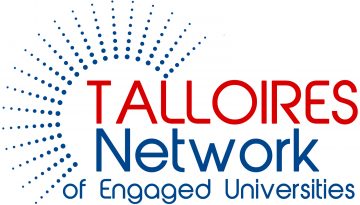What We Do
The Talloires Network of Engaged Universities connects universities from around the world to build a global movement of civically engaged higher education institutions. We advocate for the sustainable expansion of university-community collaborations to identify and address societal challenges, and we recognize and promote the most promising practices from our members and others in the field of higher education. We strive to correct a historical imbalance by increasing the visibility in particular of innovative civic engagement activities ongoing in the Global South.

The Network’s action-research programs demonstrate some of the ways in which we seek to discover solutions and build solidarity. We are constantly invigorated by the Network’s ability to create opportunity, foster empathy, and instill hope. Designed to raise the profile and standards of civic engagement in higher education, these activities include:
-
- student seminars and exchanges,
- faculty and staff development workshops,
- university-community experiments in bridging differences,
- awards to publicly recognize engaged scholarship,
- grants to encourage and support engaged scholarship,
- reflection-on-practice interviews and webinars,
- writing and research collaborations,
- dissemination of publications and news on social media platforms,
- formation of new national and regional networks,
- regional gatherings and international conferences
History
The beginning of this millennium witnessed a global trend toward greater engagement between universities and their communities, characterized by systemic efforts to mobilize the expertise and person power of these institutions to address pressing societal needs. However, there was limited international coordination and exchange on such issues among the heads of universities. As such, the nascent university civic engagement movement was largely dependent upon the individual initiative of students, faculty, and administrators. Efforts were often isolated in departments or schools rather than institution-wide. It was difficult for innovators to readily access a global perspective or learn from their peers’ work elsewhere around the world.
In September 2005, Tufts University convened the Talloires Conference 2005, the first international gathering of the heads of universities devoted to strengthening the civic roles and social responsibilities of higher education. Held at the Tufts European Center in the alpine village of Talloires, France, the conference brought together 29 university presidents, vice-chancellors, and rectors from 23 countries around the world. It was convened by then Tufts President Lawrence S. Bacow and organized by the Tisch College of Civic Life at Tufts and Innovations in Civic Participation (ICP).
Although the conference participants represented starkly different contexts and types of universities, they found that they embraced very similar visions and strategic orientations. Together, they produced the Talloires Declaration of the Civic Roles and Social Responsibilities of Higher Education. All signatories of the Declaration have committed their institutions to incorporating civic engagement into their education, and to strengthening the application of university resources to local and global community problems. Tisch College and ICP worked together to provide secretariat services for the Network and to foster its development. From its beginning, development of the Network and its activities has been guided by a Steering Committee of higher education leaders from around the world. Lawrence S. Bacow served as the Steering Committee Chair from 2005 to 2011.
In 2011, more than 200 presidents, vice-chancellors, rectors, and other senior staff members gathered in Madrid, Spain, for the second Talloires Network Leaders Conference to exchange experiences and best practices, and to envision the next stage of our movement. Our third global conference was held in 2014 in Cape Town, South Africa. More than 200 university leaders and civic engagement practitioners participated in this gathering, which included productive conversations on topics such as community-based research, social entrepreneurship, and fundraising for university civic engagement. Mark Gearan served as the Steering Committee Chair from 2011 to 2014.
Our fourth global conference was held in June 2017 in Veracruz, Mexico. More than 250 university leaders from 31 countries typically separated by borders and language met to exchange ideas and work together to mobilize higher education as a force for addressing the world’s most pressing societal challenges. They used the opportunity to articulate shared values for university civic engagement, signing the Veracruz Declaration in Xalapa, Mexico.
Our fifth global conference was held from 30 September to 3 October, 2021. Hosted by Tufts University and Harvard University, TNLC2021 reached more than 1,400 university leaders, faculty, staff, students, and community partners from 53 countries worldwide. We increased access and participation by providing 18 Grants for Engaged Universities in 14 countries to host safe local gatherings, conducting all 24 conference sessions in English and Spanish, recording sessions to accommodate time zone differences, featuring the movement-building event in University World News, and shipping electronic devices to student participants around the world. Together we produced and signed the 2021 Declaration, a statement of our shared values and vision for higher education. We also documented key takeaways in the TNLC2021 Report and Short Film.
Since its founding conference, the Network has grown to 448 members in 92 countries with a combined enrollment of over 6 million students. Nieves Segovia, President of Universidad Camilo José Cela (Spain), currently serves as the Steering Committee Chair. Since the retirement of the Network’s co-founder Professor Rob Hollister in June 2016, Professor Lorlene Hoyt has led the organization as Executive Director. Throughout the history of the Network, Tufts University Presidents have served as ex officio members of the Steering Committee.